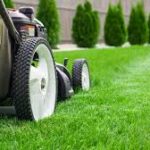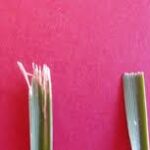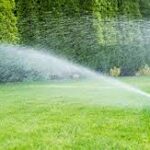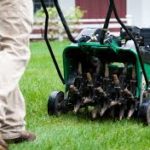Summer heat stress presents a serious problem, especially in August for lawns in New Jersey. August in New Jersey can be hot with consistent heat and inconsistent rain which can take a toll on you lawn. At Green Side Up we will help you maintain a healthy lawn and this is why we wanted to give you some tips on August Lawn Care in New Jersey.
Mowing
Mow high. Put your lawn mower on a high setting, to leave the grass around 3 inches high. Taller blades provide more shade for your lawn’s root system, which keeps it cooler during hot summer days. Additionally, taller blades of grass result in deeper, stronger roots.
Sharpen mower blades
If the blades are dull or nicked, it will tear the edge of the grass blade, instead of making a clean cut. This torn end will usually turn brown a few days after mowing and become more susceptible to pests and diseases. But if the blades are nice and sharp, the grass will get a clean cut, which will greatly reduce damage and stress.
Watering
The lawn should receive roughly 1 to 1 ½ inches of water per week. Whether you water with a hose or an irrigation system, a deep watering, less frequently is ideal. Place a coffee can or Tupperware out on the lawn to determine how long it takes to collect 1 to 1 ½ inches of water. Light watering that just dampens the grass can create disease problems. Very early morning watering is ideal (between 4:00 – 9:00 am). This gives the grass time during the day to dry out. If you water in the evening, the lawn will stay wet over night which can leave the grass susceptible to disease.
Look for disease activity
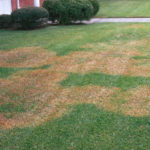 If there is disease present on your lawn, it is critical to identify it first so you can understand the potential issues as well as treatment options. For diseases that cause significant damage, like brown patch and leaf spot, applying a fungicide when the disease first emerges can save the health of your lawn. Applying fungicides after the disease is present stops the disease from spreading. By skipping the fungicide, disease can spread through your whole lawn causing large areas of dead grass. Notify your lawn specialist so a quick diagnosis can be made and treatment applied in a timely manner to decrease damage to lawn.
If there is disease present on your lawn, it is critical to identify it first so you can understand the potential issues as well as treatment options. For diseases that cause significant damage, like brown patch and leaf spot, applying a fungicide when the disease first emerges can save the health of your lawn. Applying fungicides after the disease is present stops the disease from spreading. By skipping the fungicide, disease can spread through your whole lawn causing large areas of dead grass. Notify your lawn specialist so a quick diagnosis can be made and treatment applied in a timely manner to decrease damage to lawn.
Prepare for aeration and seeding
Late summer and early fall is the best time to aerate and seed your lawn in New Jersey. Generally, this timing will allow adequate grass growth prior to winter. Cool evening and moderate daytime temperatures, along with anticipated fall precipitation, are conducive to rapid seed germination. In addition, many weeds including crabgrass are no longer germinating, reducing competition in new grass.
If you are having us core aerate and seed a good tip is to water regularly in the days leading up to your service date. This will soften the parched ground and allow us to remove a deeper core making the aeration process more effective. Just prior to our service have a fresh cutting. For those of you who have moss issues, now is the time to rake it out prior to seeding.


